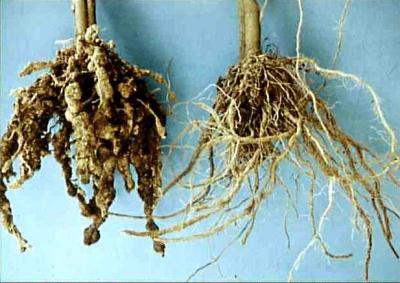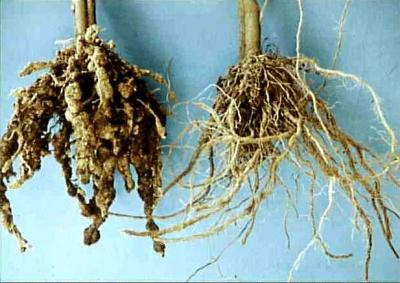Featured Photo

Other Photos

featured_photo_title
Root-knot nematodes
feaured_photo_co
A. M. Varela, icipe
Is this a Minor Pest?
Yes
Minor Pest Title
Root-knot nematodes (Meloidogyne spp.)
Minor Pest Description
Root-knot nematodes are very destructive to tomatoes. Damage is most serious on light sandy soils in furrow-irrigated crops. The nematodes cause small lumps known as root knots or galls on the roots. Heavily infected roots are severely distorted and swollen. In time the roots rot. The affected plants are either stunted or have tendency to wilt or even die in hot weather. The affected plants, in most cases, just wilt with the foliage still green - without yellowing. The nematode problem is primarily due to improper crop rotation.
Minor Pest What to do.
- Rotate tomato with brassicas or small-grained cereals (millet, sorghum).
- Do not locate seedbeds where susceptible vegetables (e.g. okra, sweet pepper, eggplant, Irish potato, carrot or cucurbits) have been previously grown.
- Use tolerant or resistant tomato varieties (e.g. "Roma VNF", "Shengena", "Tengeru-97", "Kentom", "Caracas", "Carmello", "Diego", "Piersol" and "Vegas"). Varieties with the "VFN" label exhibit some resistance - the "N" stands for Nematode-tolerant.
- Use mixed cropping or grow trap crops such as marigolds (Tagetes spp.) or sunnhemp (Crotalaria juncea).
- Maintain high levels of organic matter in the soil (manure and compost).
- Amend the soil with neem. Mixing neem cake (residue of neem seed after expression of neem oil) increases the organic content of the soil and kills nematodes due to the naturally-occurring nematicidal compounds in neem.
Minor Pest Position
11
Minor Pest Firstcontent
113
Pest Type
nematodes (Pests)
Other Crops
Dolichos
Host Plants
Tomato
Featured Image
PH Pests Media Gallery
